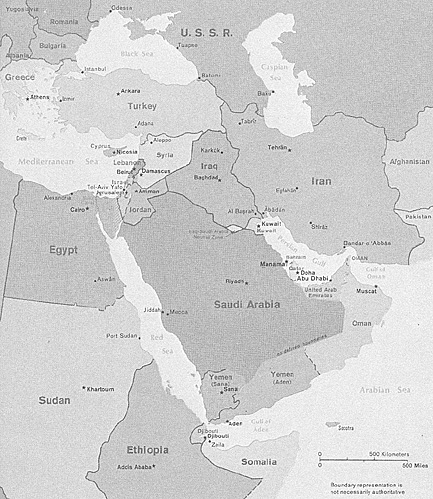 Knowledge of Arab Customs is Part of Middle East Mission
Knowledge of Arab Customs is Part of Middle East Mission
U.S. Central Command Middle East analysts say the Arab people are sensitive about the basing of foreign troops on their soil. American forces are being advised to avoid any comments or actions that could lead anyone to believe that the U.S. deployment could be permanent.
Jumbo Map: Middle East (extremely slow: 472K)
Here are some of the guidelines for soldiers deploying to the Middle East regarding Arab customs, courtesies and gestures:
Alcohol-- Moslem religion restricts the use of alcohol and it is prohibited by many host countries in the MiddleEast theater. Army officials say that in deference to the Arab hosts, alcohol will be prohibited. Pornography and sexually explicit literature is equally unacceptable in the Arab society, officials say, and is also prohibited in the theater.
Handshaking/Sitting -- Shake hands whenever meeting an Arab, and when leaving him. Never sit and expose the sole of one's shoes or bottoms of feet to an Arab. It is regarded as an insult.
Conversation-- Generally take the lead from what an Arab brings up in conversation, but avoid asking personal questions. Do not ask questions about the women of an Arab family.
Friendship-- Arabs take friendship very seriously. The Arab concept of friendship is one of duration and intensity. Before an Arab enters into a friendship, he must find out all about a person to see how much influence one has and if the person might embarrass him. If someone misrepresents his background, not only will it affect credibility -it can seriously harm the Arab's standing and that of his family. Remember, however, that the Arab system of friend-ship balances favors against obligations. When favors are asked by an Arab, never give a flat "no," it will signal a desire to end the friendship.
Touching-- Touching and holding hands with members of the same sex in public is acceptable among Arabs and demonstrates friendship. Touching or kissing members of the opposite sex in public is considered to be in extremely bad taste or obscene.
Distance-- Arabs stand very close to one another when talking. Westerners may find this uncomfortable, but do not back away.
Time-- Do not be impatient with local people. If hurried, nothing will get done. However, late arrival for an appointment is a public insult.
Criticism-- Unlike Americans, Arabs do not accept or give criticism directly. Even constructive criticism of an Arab's work or ideas in public is considered an insult. It is especially rude to contradict a person of status or a superior in rank or age. An Arab's ideas or suggestions should always be given recognition.
If criticism is required, take the Arab aside privately and gradually lead up to the subject in an indirect and very tactful manner. Arabs understand and appreciate tact because it protects public image and avoids insult.
Patronizing-- Do not talk down to someone because he doesn't speak English well.
Photography-- Do not take pictures of military or civilian-installations or equipment, military or civilian police, or civilian airport or seaport facilities without permission of the host country. Do not photograph people at close range (particularly women) without permission.
Women-- Do not stare at or strike up a conversation with Arab women in public.
Back to Table of Contents -- Winning in the Desert
Back to CALL List of Issues
Back to MagWeb Magazine List
© Copyright 2004 by Coalition Web. Inc.
This article appears in MagWeb.com (Magazine Web) on the Internet World Wide Web.
Other articles from military history and related magazines are available at http://www.magweb.com